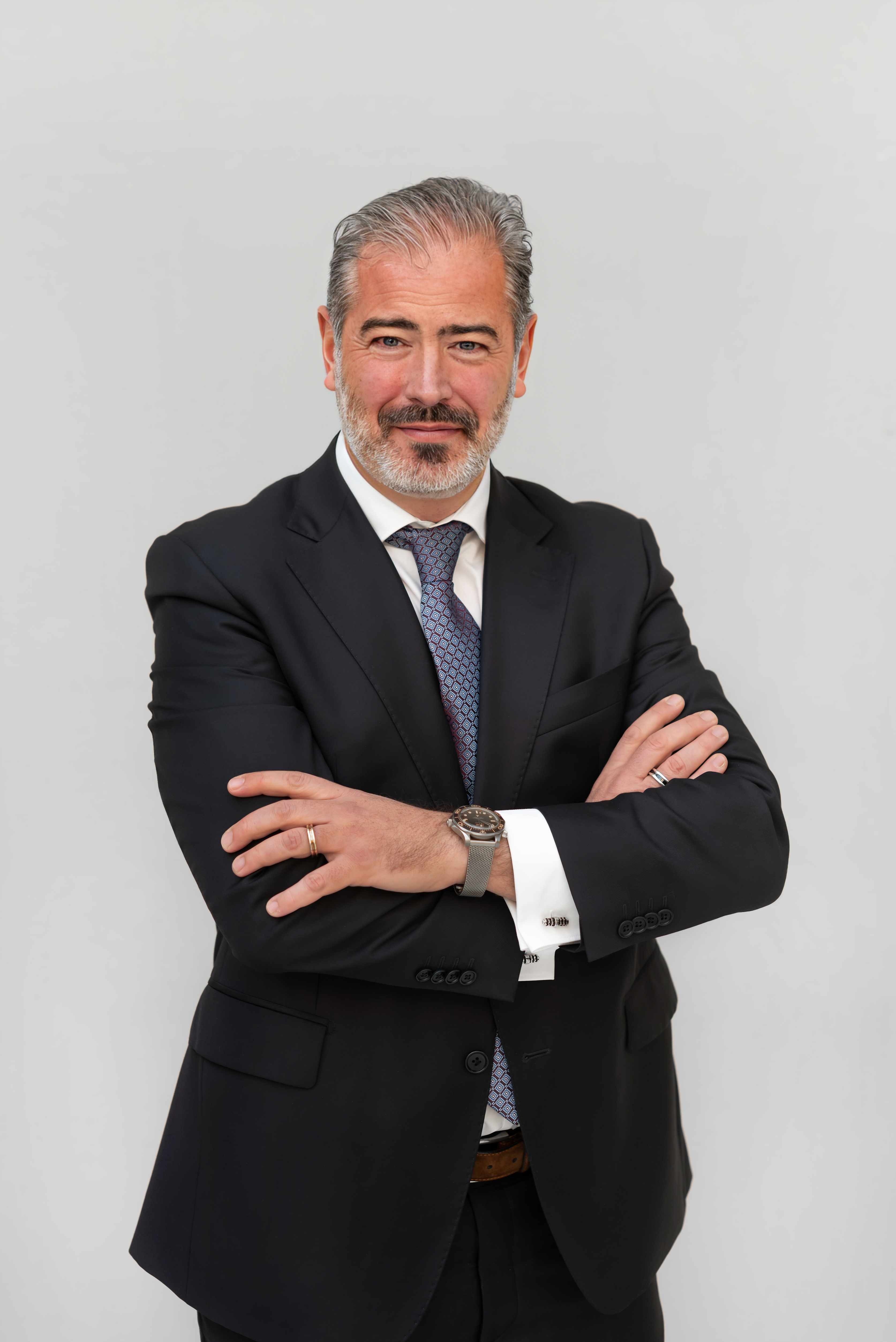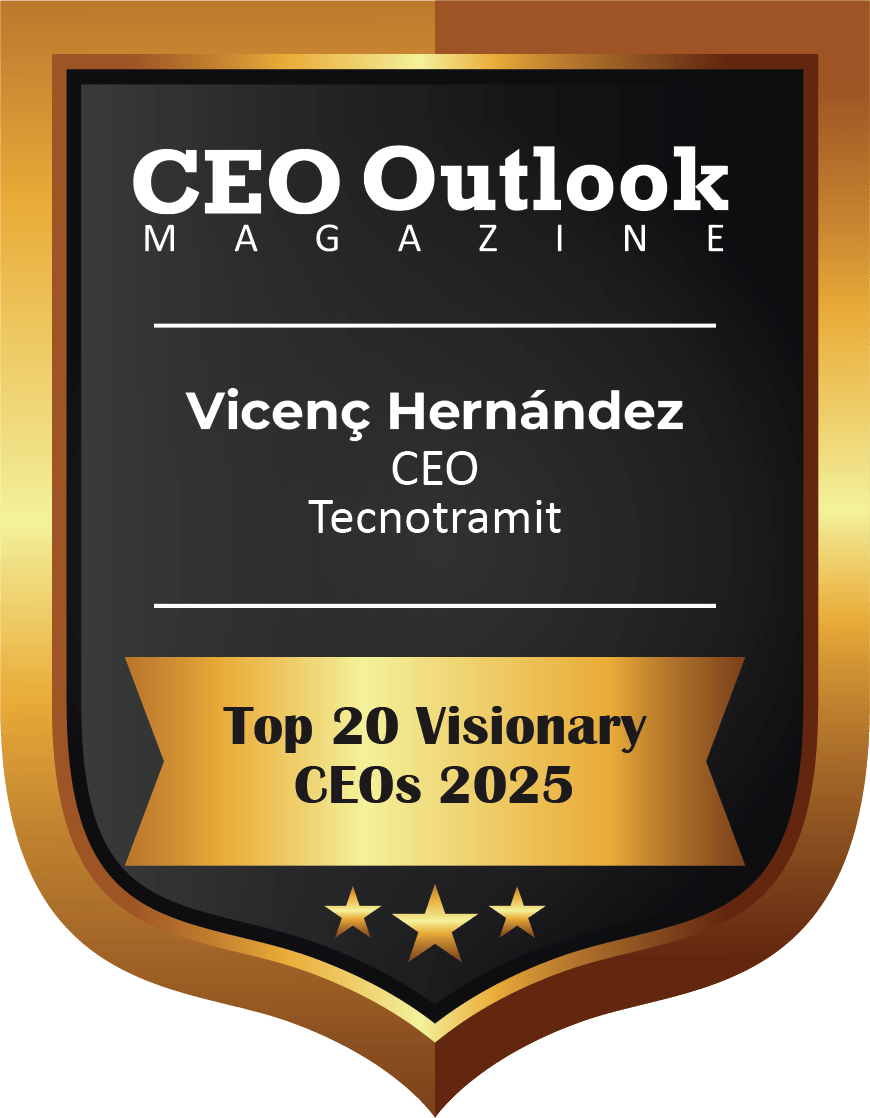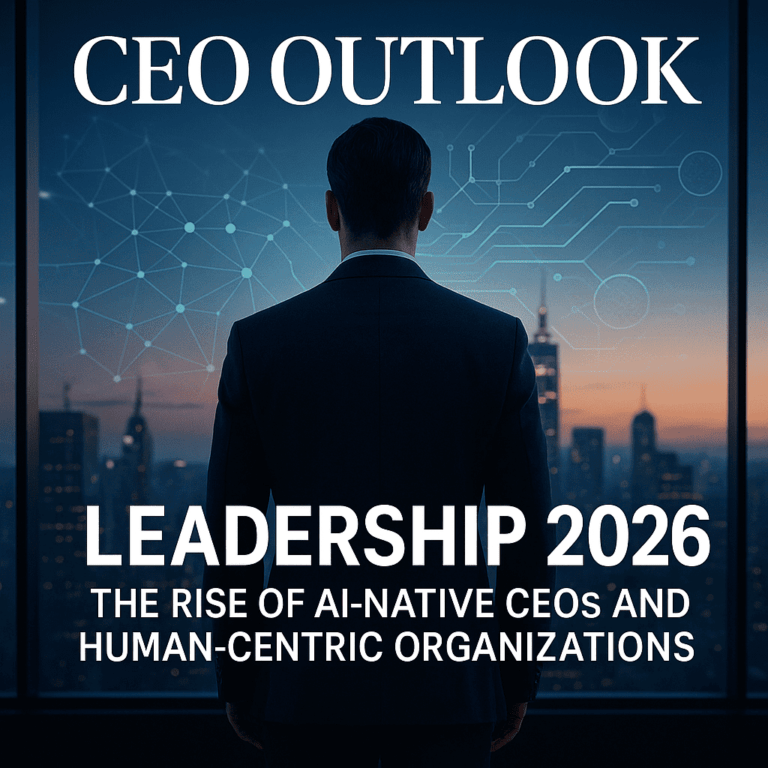Vicenç Hernández | Chief Executive Officer | Tecnotramit

Vicenç Hernández
Chief Executive Officer

“As Hernández puts it, “Change has never been as rapid as it is now, but it will never be slower than it is today.” Tecnotramit isn’t just adapting—it’s shaping the future.”
Architect of Transformation in Real Estate and Finance
The global real estate and financial sectors have long been intertwined, each shaping and reshaping the other in a delicate balance of opportunity and risk. Few understand this dynamic better than Vicenç Hernández, CEO of Tecnotramit, who has spent over two decades navigating the intersection of these industries. His perspective is not merely theoretical—it is forged through firsthand experience and a deep understanding of economic psychology, leadership, and market evolution.
Real estate serves as more than a necessity; it is an investment vehicle, a source of wealth, and a critical component of economic stability. Hernández has seen firsthand how housing markets influence monetary policy, economic mobility, and financial resilience. While the connection between real estate and banking has always been profound, it was the 2008 financial crisis that truly underscored its fragility. The collapse of the housing bubble in the United States rippled across the globe, triggering the most severe economic downturn since the Great Depression. This turning point forced financial institutions and policymakers to rethink the structure of real estate markets, recognizing their central role in economic stability.
Boom-and-bust cycles in real estate have historically had devastating consequences, destabilizing banks, causing mass unemployment, and deepening recessions in developed economies. Hernández acknowledges that understanding these cycles is crucial not only for survival but for innovation. As both industries undergo rapid transformation, traditional business models risk obsolescence. Companies that fail to adapt will disappear, leaving room for dynamic service providers to redefine the way financial and real estate firms operate. The future, Hernández believes, belongs to those who recognize that these sectors must evolve in tandem, integrating efficiencies and shared expertise to drive sustainable growth.
Economic Psychology and Leadership: The Invisible Force Behind Success
Leadership, as Hernández sees it, is rooted in understanding human behavior. With a PhD in Economic Psychology, he applies behavioral economics to every aspect of Tecnotramit—from decision-making to negotiation strategies. Emotional intelligence is not a secondary skill; it is fundamental. Whether solving internal disputes or navigating client relations, Hernández recognizes that psychology plays an undeniable role in shaping economic decisions.
A company’s culture reflects its leadership, and Hernández ensures that Tecnotramit fosters a collaborative atmosphere. Economic psychology may not eliminate mistakes, but it does offer a framework for avoiding pitfalls in high-pressure situations. He advocates for the integration of behavioral economics into corporate strategy, believing that professionals who master psychological insights gain an edge in negotiation, customer engagement, and long-term decision-making.
Identifying Market Gaps: The Power of Adaptation
Opportunities often emerge in the midst of disruption. For Tecnotramit, the 2008 financial crisis was one such pivotal moment. Originally a mortgage management firm catering primarily to banks, Tecnotramit seized the opportunity to diversify its portfolio, expanding into real estate asset management for large investors. It was a strategic shift, reducing unsystematic risk and addressing a crucial market void. The crisis had left institutions overwhelmed, and Hernández understood that stepping in with a robust, efficient service model was the key to survival.
Today, Tecnotramit stands at another crossroads. The mortgage market, once predictable, is evolving rapidly, and the question remains—how will real estate servicing companies adapt? Hernández warns that identifying market gaps requires vigilance, not reactionary thinking. Companies often wait until they are forced into reinvention when, ideally, they should evolve ahead of the curve. The greatest opportunities arise in turbulent times, but only those prepared to seize them will thrive.
Spain’s Housing Crisis: Breaking the Cycle of Short-Sighted Policy
Spain stands at a crossroads—a nation brimming with potential, yet paralyzed by short-sighted housing policies that have turned opportunity into crisis. The real estate market, once a pillar of investment and growth, now finds itself trapped in a bureaucratic nightmare, strangled by excessive regulations and burdened by crippling taxation. The result? A widening chasm between supply and demand, an exodus of investors, and a population struggling against an affordability crisis that shows no sign of easing.
The fundamental flaw lies in leadership that prioritizes election cycles over long-term strategy. Housing, like healthcare and education, demands vision beyond the immediate political horizon—a 20- or 25-year blueprint that fosters stability, not volatility. Yet, instead of crafting enduring solutions, policymakers have accelerated Spain into a deeper economic quagmire, where each reactionary measure worsens the problem rather than solves it.
The path forward is clear, but it requires courage. First, Spain must dismantle the excessive administrative bureaucracy suffocating new development—every unnecessary delay in construction is another blow to affordability. Next, we must rethink the paradox of housing as a welfare pillar while treating it as a tax burden—true accessibility means reducing taxes, incentivizing purchases and rentals, and ensuring legal protection for landlords and tenants alike.
But the most pressing challenge is Spain’s abysmally low stock of protected housing. Public housing cannot be a mere political slogan; it must be a meticulously managed resource, built through meaningful collaboration between the public and private sectors. Without structured investment in affordable homes, Spain will continue to deepen its housing inequality—trapping vulnerable families in an endless struggle while opportunities slip through the nation’s fingers. The moment for decisive action is now. Spain must choose: transformation or stagnation.
Tecnotramit: Reinventing Real Estate and Finance Through Innovation and Purpose
A company’s legacy is not just built on its successes but on its ability to adapt, evolve, and redefine its industry. Tecnotramit’s journey from a mortgage management company to a leading service provider in Spain and Portugal is a masterclass in strategic foresight, agility, and resilience. With the financial and real estate sectors undergoing seismic shifts, Tecnotramit continues to stand at the forefront, ensuring that innovation is not just a buzzword but a defining force in shaping the future.
When Tecnotramit was founded, the real estate industry was largely defined by conventional practices. Mortgage management was its core operation, but the company soon realized that relying solely on one type of service posed an existential risk. Markets change, clients adapt, and companies that remain stagnant soon fade into obscurity. Tecnotramit chose a different path—one driven by professionalization, territorial expansion, and diversification.
The first strategic pillar in Tecnotramit’s growth was structuring its internal framework for adaptability. A company built for scale cannot remain tied to the operational models that worked at its inception. Leadership recognized that successful teams at earlier stages might not be equipped for exponential growth, prompting a radical transformation in the company’s structure. Agility became a core value, ensuring Tecnotramit could pivot in response to external market forces rather than being weighed down by its past.
Territorial expansion was the next crucial move. In the B2B world, understanding corporate strategies and anticipating shifts is key to staying relevant. Years ago, Spanish banks were rapidly expanding their offices, signaling an urgent need for service providers with nationwide accessibility. Tecnotramit responded by enhancing its territorial presence across Spain’s most vital cities. Today, that banking strategy has reversed—offices are closing—but the demand for customer proximity remains. Tecnotramit, with its established network, is uniquely positioned to bridge the gap, leveraging its reach to provide banking clients with efficient service delivery.
The 2008 financial crisis was the final catalyst for diversification. The economic downturn exposed a severeover-reliance on a single client and a limited service portfolio. Rather than retreat, Tecnotramit recognized the crisis as an opportunity. The financial sector was overwhelmed, desperate for new strategies to manage distressed assets. Tecnotramit swiftly expanded its offerings beyond mortgage management, becoming a multi-service entity catering to real estate and financial institutions alike. In a short span, its operations quadrupled. The company’s ability to identify opportunity within disruption secured its place as a market leader.
The Digital Revolution: Balancing Technology with Humanity
Digital transformation has become synonymous with progress, but Hernández warns that true innovation cannot be dictated by technology alone—it must serve a greater strategic vision. The industry is inundated with fintech and proptech solutions addressing isolated inefficiencies. However, success lies in understanding how these innovations align with an organization’s entire value chain.
For Tecnotramit, proximity to the client remains the guiding principle. Technology optimizes, but it cannot replace human connection. The company strategically integrates digital advancements without losing sight of its most fundamental value: customer-first service. The danger, Hernández argues, is falling into the trap of believing that automation can wholly replace personalized interactions.
Recognizing this, Tecnotramit launched Onizea, a technology-consulting firm committed to ensuring digital solutions enhance—not overshadow—the human aspect of business. Digital disruption has undeniable advantages, but companies must avoid polarization—blindly favoring either full automation or traditional methods. The real differentiator in the coming years won’t be artificial intelligence, but emotional intelligence. Managing human talent effectively will prove more valuable than technological advancements alone. As Hernández aptly notes, “Technology can be copied; talent must be nurtured.”
PropTech is reshaping real estate at breakneck speed, but Hernández sees a flaw in how many companies approach innovation. There is a dangerous misconception that equates innovation with technology alone, leading organizations to adopt new systems without first refining their foundational processes. True innovation, Hernández argues, is strategic—it requires cultural transformation before technological implementation.
Understanding cognitive biases is equally crucial in investment strategy. Hernández’s concept of “the price trap” illustrates how emotions distort financial decisions. Investors tend to justify overpriced assets once they become emotionally attached, overlooking rational assessments. Similarly, insomnia levels—the threshold of risk an investor can tolerate without losing sleep—dictate the boundaries of smart investment choices. These psychological principles, though often ignored, play a vital role in the financial and real estate landscapes.
The Power of Purpose: Social Responsibility as a Business Imperative
Success is not measured solely in financial growth, but in how a company impacts its people and the world around it. Tecnotramit has embraced social responsibility as a guiding force, implementing policies that foster gender equality and employment for individuals at risk of social exclusion.
Leading by example is a fundamental philosophy. Corporate social responsibility must extend beyond surface-level gestures; it must be lived, ingrained in daily operations. Tecnotramit’s workforce is a reflection of its commitment—more than 80% of its management team comprises women, with most leaders having risen through the ranks internally rather than being externally recruited. This approach has cultivated an environment where employees see the company as more than a job—it is a long-term career, a partner in their professional journey.
The company also challenges ageism, maintaining a workforce with a significant percentage of employees over 50. Experience, Hernández believes, is an invaluable asset, one that sets an example for younger employees. Companies that prioritize early retirements to cut costs often pay the price in diminished expertise and prolonged training cycles. Investing in diverse talent fosters an environment of mutual learning and sustainable growth.
Social responsibility has shifted from a branding exercise to a necessity for attracting top talent. Employees seek companies that align with their values, and Tecnotramit’s commitment to inclusivity has strengthened its reputation as a progressive employer.
The Future: Navigating an Era of Uncertainty with Strategic Agility
Looking ahead, Hernández sees mortgage brokerage as an area ripe for transformation. Spain’s reliance on banks for financing is disproportionate compared to nations such as the U.S., Italy, and France. As bank consolidation continues and physical branches disappear, mortgage brokerage stands poised for disruption. Likewise, tokenization—a revolutionary approach to real estate financing—will redefine banking models. The industry is on the brink of reinvention, and those who embrace the fusion of technology and regulation will lead the charge.
The financial and real estate sectors are undergoing their most significant transformation in decades. Hernández predicts that future opportunities will favor companies that embrace change, recognizing that agility—not speed—will determine success. Many firms mistake rapid movement for adaptability, failing to understand that true agility requires structural readiness to pivot in response to shifting global dynamics.
Until recently, economic trends dictated geopolitics. Now, geopolitics drives economic outcomes, introducing external factors beyond any company’s control. The key to survival is building resilient frameworks capable of responding to sudden shifts. Tecnotramit’s evolution has prepared it for these changes—by professionalizing operations, embracing digital transformation while preserving human connection, and fostering a workplace culture rooted in inclusion and purpose.
In the realm of businessprocess outsourcing (BPO), consolidation will become essential. Real estate servicing companies must pivot toward specialized, streamlined operations to meet the growing demands of large property owners. Tecnotramit, recognizing the opportunities in Latin America, is already engaged in strategic discussions with investment funds to expand its footprint.
The path forward requires an international outlook. Outsourcing firms must break industry silos, integrating financial, real estate, and insurance services into cohesive, value-driven solutions. Hernández understands that success will not come from isolated innovation, but from strategic alignment—where markets, psychology, and digital transformation merge to create an enduring competitive advantage.
As Hernández puts it, “Change has never been as rapid as it is now, but it will never be slower than it is today.” Tecnotramit isn’t just adapting—it’s shaping the future.
























































